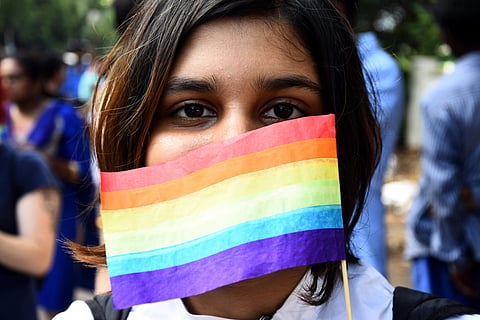

The Supreme Court, on September 6, 2018, in a unanimous landmark-judgment decriminalised homosexuality and read down the 157-year-old Section 377 of the Indian Penal Code. “Section 377 is arbitrary. LGBT community possesses rights like others. Majoritarian views and popular morality cannot dictate constitutional rights," noted Chief Justice of India Dipak Misra reading out the judgment on behalf of himself and Justice Khanwilkar, "Respect for the individual choice essence of liberty. LGBT community possesses equal rights under the Constitution."
He added, "Primary objective of having a Constitutional society is to transform the society progressively. Constitutional provisions should not be interpreted in a literal sense. Sexual orientation of an individual is natural and discrimination on the basis of sexual orientation is a violation of Freedom of Expression."
Justice Rohinton Nariman, placing extensive reliance on foreign jurisprudence including recent judgment from Trinidad and Tobago, said that one feature of his judgment is reliance on Mental Healthcare Act as per which Parliament has recognised that homosexuality is not a mental disorder.
"Gays, Lesbians, Bi-sexual and Transgenders have equal rights as other citizens. This case is much more than just decriminalising a provision It is about an aspiration to realise Constitutional rights and equal existence of LGBT community as other citizens," said Justice Chandrachud. "De-criminalisation is but the first step; The Constitution envisages much more. LGBTs are victims of Victorian morality. Constitutional morality and not Societal morality should be the driving force for deciding validity of Section 377."
History owes an apology to LGBT persons for ostracisation, discrimination, noted the judgment stating that this judgment has to be considered in all pending prosecutions.
Chapter XVI, Section 377 of the Indian Penal Code dating back to 1861, introduced during the British rule of India (modelled on the Buggery Act of 1533) criminalized sexual activities "against the order of nature", including homosexual activities, "Whoever voluntarily has carnal intercourse against the order of nature with any man, woman or animal, shall be punished with 1[imprisonment for life], or with imprisonment of either description for a term which may extend to ten years, and shall also be liable to fine."
The government, who eventually backed out from opposing the bill, was apparently worried that if the LGBTQ community is given legal recognition they might demand other rights as well, including wealth, inheritance, adoption, compulsory employment and maintenance.
The LGBTQ community in India has been fighting for their rights and against this ancient section of the IPC. Not only is their sexual preference criminalised they have been marginalised in the society for centuries — from getting a job to walking down the road every day to day job becomes a hurdle. Activists argue that it is just about equal rights to all the citizens.
The section was read down with respect to sex between consenting adults by the Delhi High Court in July 2009. That judgment was overturned by the Supreme Court of India on December 11, 2013 with the Court holding that amending or repealing section 377 should be a matter left to Parliament, not the judiciary. On February 6, 2016, the final hearing of the curative petition submitted by the Naz Foundation and others came for hearing in the SC. The three-member bench headed by the then Chief Justice of India T S Thakur said that all the 8 curative petitions submitted will be reviewed afresh by a five-member constitutional bench.
On August 24, 2017 in a landmark judgment (also known as the Puttuswamy judgement), the SC had upheld the Right to Privacy as a fundamental right under the Constitution. The SC also had called for equality and condemned discrimination, stated that the protection of sexual orientation lies at the core of the fundamental rights and that the rights of the LGBT population are real and founded on constitutional doctrine. The Puttuswamy judgment is believed to have implications for section 377 as consensual sexual acts in private can no longer be overseen by law.
In January 2018, a three-member SC bench heard a petition filed by five people asking the SC to revisit the Naz Foundation judgment. The case was referred to a larger bench and help was sought from the Union government. On July 10, 2018, a five-member constitutional bench of the SC commenced hearing of the pleas challenging the constitutionality of section 377.
